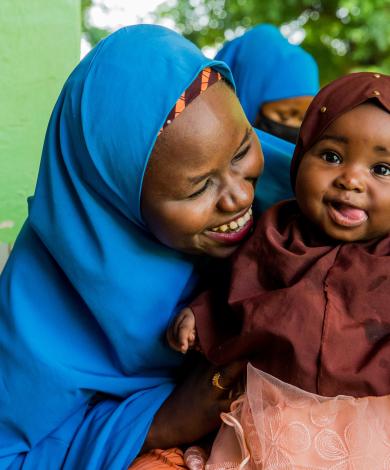Take Ten Steps Up for Breastfeeding
Imagine if every baby was born in a place where the best practices for supporting breastfeeding are the norms. The Ten Steps to Successful Breastfeeding are evidence-based practices that improve breastfeeding rates by establishing benchmarks for quality care for new mothers and infants in maternity services.
During World Breastfeeding Week, we joined the Global Breastfeeding Collective to learn about the Ten Steps to Successful Breastfeeding.
Watch the recording of the webinar to learn about the Ten Steps to Successful Breastfeeding, find tools and resources to help adopt them in health systems, and be inspired by stories about the Ten Steps in action. Together, we can ensure every baby starts right in life by scaling up and providing universal quality of care in a baby-friendly environment.
World Breastfeeding Week webinar and Q&A
The MAMI Global Network and the Infant Feeding in Emergencies (IFE Core Group) hosted a webinar to learn how you can step up to save lives:
The above video is the Africa, Europe and Asia Pacific recording, with a case study on Rwanda.
ENN shared information about the MAMI Global Pathway Package on August 3rd as part of the Global Breastfeeding Collective’s webinar "Take ten steps up for breastfeeding" and "Two more reasons to step up". This 10-minute presentation introduces practical details and examples of applied practice for the MAMI Care Pathway Package, followed by an update on the Infant Feeding in Emergencies (IFE) Operational Guidance and a brief Question and Answer session which is compiled here.
Currently also available in the following languages:
English - the Americas (with a case study on Colombia)
Further recordings of the webinar in other languages will be forthcoming in the next few weeks.
For the report released during the webinar, "Infant and Young Child Feeding in Emergencies Ten Years of Progress".
This year, World Breastfeeding Week (1-7th August) focuses on breastfeeding education and support, encouraging everyone to ‘step up’ for breastfeeding. The importance of providing effective, regular breastfeeding support cannot be overstated. Breastfeeding is one of the top interventions for reducing under-five mortality, with breastfeeding practices potentially averting 823,000 deaths annually, if scaled up universally. Where resources are limited, the most vulnerable infants and mothers must be prioritised. Malnourished infants under six months of age, defined as small and nutritionally at-risk, are an especially vulnerable group. Globally, one in five infants under six months are small or nutritionally at-risk, which includes those that are born with a low birth weight, those that are stunted, wasted and/or underweight. Such measures of poor growth in the first six months of life are significantly associated with an increased risk of death. However, we do not yet provide sufficient breastfeeding support to these infant-mother pairs to enable them to survive and thrive.
We have the tools at hand, with UNICEF and WHO’s ten steps to successful breastfeeding proven to increase breastfeeding rates. Yet in practice, the tenth step, which is to ‘coordinate discharge so that parents and their infants have timely access to ongoing support and care’, falls far short in practice. Specifically, we see:
- Poor continuity of care for at-risk infants and their mothers beyond the immediate postnatal period.
- Inadequate screening to identify vulnerable infants and mothers.
- Insufficient specialised breastfeeding support for vulnerable mothers and infants up to six months of age.
- An overreliance on inpatient care which is not a practical option for many families and is also an expensive health service to fund.
This is where the management of small and nutritionally at-risk infants under six months and their mothers (MAMI) can make a huge difference. The MAMI Care Pathway Package, developed by the MAMI Global Network led by ENN and LSHTM, is a resource material to assist practitioners to identify, assess, and manage small and nutritionally at-risk infants under 6 months of age and their mothers. It places the mother-infant dyad at the centre, with targeted breastfeeding support a key element of care.
The MAMI Care Pathway Package provides a framework for continuity of quality, respectful care for infants under six months and their mothers across maternal and infant nutrition and health services. It is designed to be adapted to each context and to build on and be integrated into existing systems and platforms across primary, secondary and tertiary care. Its primary focus is on providing community-based outpatient care.
The MAMI approach complements existing breastfeeding support services, dovetailing with existing infant and young child feeding (IYCF) interventions, which operate at the primary level of intervention. IYCF and MAMI are both essential initiatives that, together, more efficiently reach and address all infants with appropriate support. The MAMI approach serves to optimise support provided through IYCF services by:
- Targeting skilled breastfeeding support to at-risk infants under six months and their mothers, rather than to the general population of infants.
- Providing skilled breastfeeding counselling as part of a larger package of clinical and social care. This may involve referrals to relevant clinical services, specialist maternal mental health services, maternal physical health and nutrition services, and other context-specific support that the pair may benefit from, such as social services.
- Providing regular and continuous targeted support, whereby infants and mothers are not discharged. Rather, they are enrolled in care until the infant reaches six months of age, with frequency of care depending on their needs. Combined with early identification, this ensures these at-risk infants and mothers are on the radar of the health service to help identify and respond to problems quickly.
A combined effort between MAMI and IYCF providers is essential to strengthen continuity of optimal breastfeeding support from birth through the first two years of life and beyond, to give these mothers and babies the best possible chance to survive, grow and develop.
Useful Links
Some other useful links that have been referenced throughout the week are:
- the Ukraine Joint Statement
- MAMI Care Pathway
- The IYCF-E Repository (an overview of peer-reviewed journals on IYCF-E articles)
